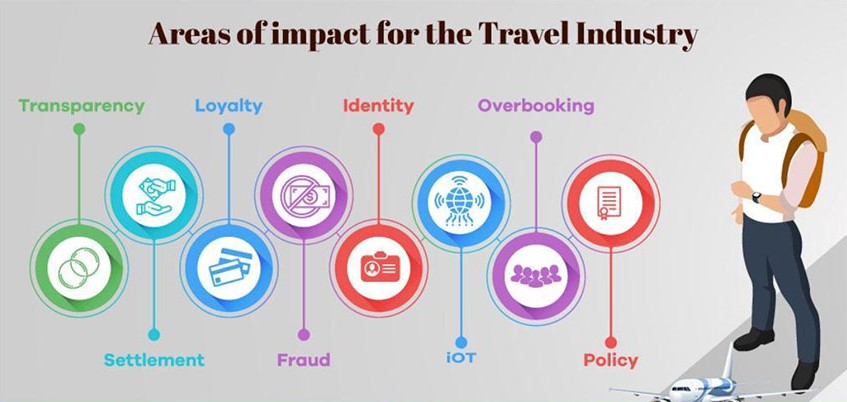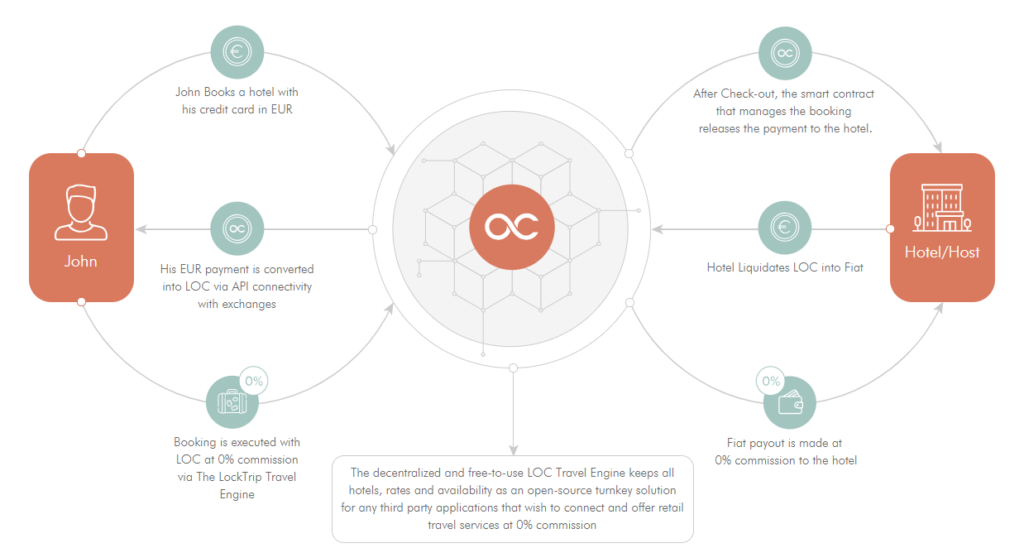SERVICES BY US
Travel Industry & Blockchain
Blockchain technology can be useful in travel industry:
- Secure and Transparent Transactions: Blockchain technology enables secure and transparent transactions through its decentralized ledger system. This means that each transaction is recorded in a distributed ledger that is accessible to everyone in the network. This creates a transparent system that eliminates the need for intermediaries like travel agents and reduces costs.

- Identity Verification: Blockchain technology can be used to create a decentralized and secure system for identity verification. This would allow travel companies to verify the identities of passengers and reduce the risk of fraud. The system would use digital signatures and public key cryptography to authenticate identities, making it difficult for fraudsters to tamper with the system.
- Loyalty Programs: Blockchain technology can be used to create a decentralized loyalty program for travel companies. This would enable customers to earn and redeem loyalty points across different travel providers. The system would use blockchain technology to securely store and manage loyalty points, making it easier for customers to use their rewards.
- Smart Contracts: Blockchain technology enables the use of smart contracts, which are self-executing contracts with the terms of the agreement between buyer and seller being directly written into lines of code. This means that smart contracts can automate certain processes, such as cancellations, refunds, and itinerary changes.
Travel companies can use smart contracts to create a more efficient and automated system for managing bookings and cancellations. For example, if a flight is cancelled, a smart contract could automatically refund the customer’s money without the need for manual intervention.
- Supply Chain Management: Blockchain technology can be used to track goods and services throughout the travel supply chain. This includes everything from the booking process to the delivery of goods and services. By using blockchain technology to track the supply chain, travel companies can optimize their operations, reduce costs, and improve customer satisfaction.
For example, a hotel chain could use blockchain to track the delivery of supplies from their suppliers. This would enable them to identify any delays or issues in the supply chain and take corrective action to ensure that they have the necessary supplies to meet their customers’ needs.
In summary, blockchain technology has the potential to make the travel industry more efficient, secure, and transparent. By using blockchain technology to create a decentralized booking platform, secure payment system, identity verification system, loyalty programs, smart contracts, and supply chain management system, travel companies can reduce costs, increase efficiency, and improve customer satisfaction. However, widespread adoption and collaboration between travel providers will be necessary to realize the full potential of blockchain technology in the travel industry.

Few blockchain case studies for Travel Industry:
- Winding Tree: Winding Tree is a blockchain-based travel platform that aims to disrupt the travel industry by providing a decentralized booking system. It allows hotels, airlines, and other travel providers to connect directly with customers, eliminating the need for intermediaries like travel agents.
By using blockchain technology, Winding Tree enables secure and transparent transactions between travel providers and customers. It also uses smart contracts to automate certain processes, such as cancellations and refunds.
- Loyyal: Loyyal is a blockchain-based loyalty and rewards platform that enables travel companies to create a decentralized loyalty program. It allows customers to earn and redeem loyalty points across different travel providers, making it easier for them to use their rewards.
By using blockchain technology, Loyyal provides a secure and transparent system for managing loyalty points. It also enables travel companies to reduce costs by eliminating the need for intermediaries in loyalty programs.
- Lufthansa: Lufthansa, one of the largest airlines in the world, has partnered with Swiss blockchain startup Winding Tree to create a decentralized travel platform. The platform aims to provide a more efficient and transparent system for booking flights and other travel services.
By using blockchain technology, Lufthansa and Winding Tree are able to create a more secure and transparent booking system that eliminates the need for intermediaries. The platform also uses smart contracts to automate certain processes, such as refunds and cancellations.
- Air New Zealand: Air New Zealand, the national airline of New Zealand, has partnered with Winding Tree to explore the use of blockchain technology in the travel industry. The airline is using blockchain to improve the efficiency and security of its supply chain management.
By using blockchain technology, Air New Zealand is able to track the delivery of goods and services throughout its supply chain. This enables the airline to identify any delays or issues in the supply chain and take corrective action to ensure that it has the necessary supplies to meet its customers’ needs.
- TUI Group: TUI Group, one of the largest travel companies in the world, has partnered with blockchain startup Winding Tree to create a decentralized booking platform. The platform aims to provide a more efficient and transparent system for booking travel services.
By using blockchain technology, TUI Group and Winding Tree are able to create a more secure and transparent booking system that eliminates the need for intermediaries. The platform also uses smart contracts to automate certain processes, such as cancellations and refunds.
In summary, these case studies demonstrate how blockchain technology can be used in the travel industry to create more efficient, secure, and transparent systems for booking travel services, managing loyalty programs, and supply chain management. By adopting blockchain technology, travel companies can reduce costs, increase efficiency, and improve customer satisfaction.
Services categories
About us

Our goal is to help our clients achieve their online goals by providing them with customized, effective, and results-driven solutions that drive growth, increase visibility, and strengthen their online presence.
Contact info
Address office
USA, INDIA, VIETNAM
Phone